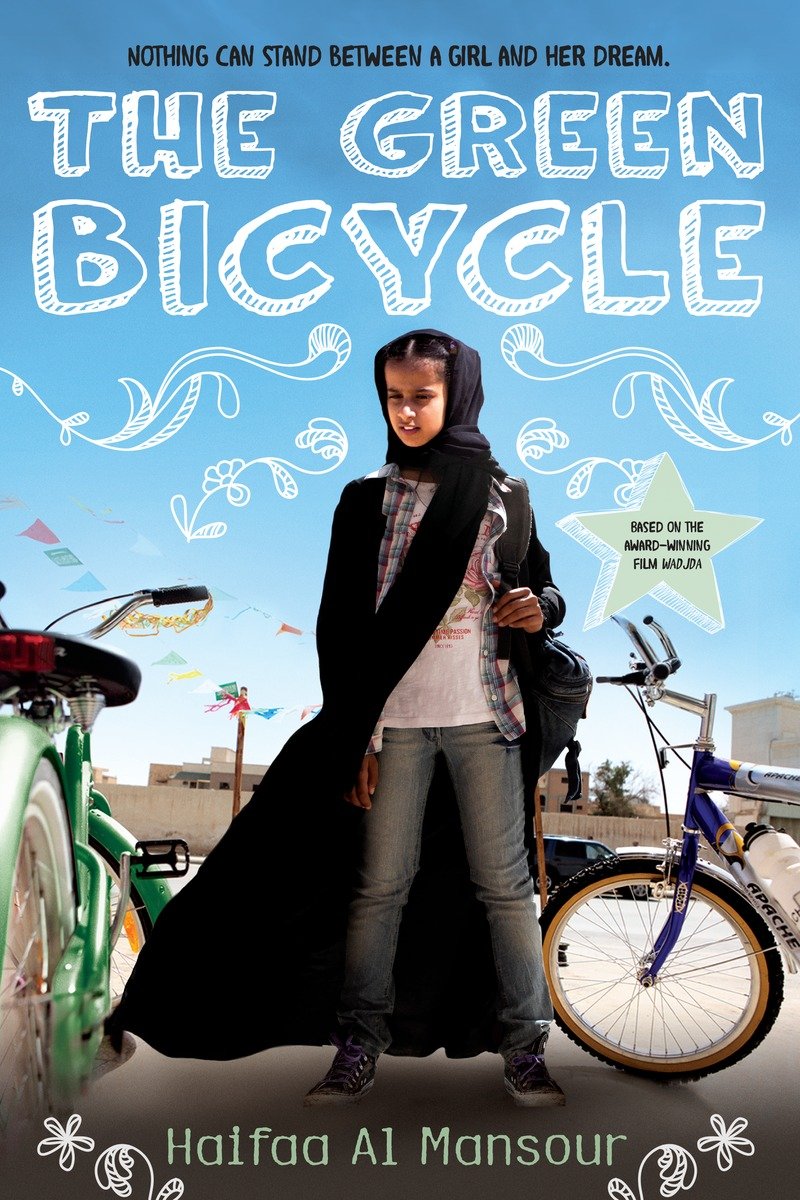
The Green Bicycle
فرمت کتاب
ebook
تاریخ انتشار
2015
Lexile Score
790
Reading Level
3-4
ATOS
5.6
Interest Level
4-8(MG)
نویسنده
Haifaa al Mansourشابک
9780698183483
کتاب های مرتبط
- اطلاعات
- نقد و بررسی
- دیدگاه کاربران
نقد و بررسی

July 15, 2015
Curious, creative, and strong-willed Wadjda stages small acts of rebellion at her girls' school in Riyadh. Eleven-year-old Wadjda isn't supposed to wear Chuck Taylor sneakers to school or sell bracelets and candy to her fellow students for extra cash. But money is tight at home, and Wadjda has always preferred to emulate tough, mischievous older girls like Fatin and Fatima rather than her pious, rule-abiding classmates. Wadjda particularly envies the freedom her childhood friend Abdullah has to roam the city on his bicycle; for Wadjda to ride a bike as a girl would not only look unseemly, but could also, as her mother explains with characteristic frankness and fear, "harm your virginity." Nevertheless, when Wadjda sees a perfect green bicycle at a toy shop, she is determined to save 800 riyals to make it hers. Wadjda's mother's struggles-a long, perilous commute to the only job she can find; Wadjda's father's search for a new wife-are juxtaposed effectively against Wadjda's own, and her alternating frustration with and compassion for her daughter's actions are palpable. Despite the restrictive environment and many setbacks, Wadjda's cleverness and determination keep the mood relatively hopeful. The author, a screenwriter, bases the novel on her first feature-length film, Wadjda. A winningly told story of struggle, solidarity, and optimism. (Fiction. 9-12)
COPYRIGHT(2015) Kirkus Reviews, ALL RIGHTS RESERVED.

August 1, 2015
Gr 4-8-In 2012, Al Mansour directed the film Wadjda and made history by becoming the first female Saudi Arabian filmmaker to shoot a full-length movie; here, she adapts her successful work for a middle grade audience, with mixed results. Hewing close to the original film, Al Mansour tells the story of Wadjda, a rebellious and snarky 11-year-old Saudi Arabian girl. In a society that prizes modesty and piety in women, Wadjda clashes with authority: fiercely independent, she talks back to adults, listens to Western music, and yearns for a green bicycle she sees in a toy store. When her wayward habits land her in trouble yet again, she decides to go in a new direction by taking part in her school's Koran competition-in order to obtain the prize money and purchase the coveted bike. Wadjda is a well-executed character: despite her feisty nature, she's vulnerable and flawed, and her story will resonate with boys and girls alike. However, whereas in Wadjda, striking visual imagery conveyed the girl's desire for freedom, here, Al Mansour relies on often-clunky prose to describe every action, thought, or emotion. The author often pauses to explain the cultural context of various elements of Saudi culture (the significance of the veil, the concept of a second wife), which provides helpful background for readers unfamiliar with the region but feels purposeful and overwritten compared with the far more artful film. VERDICT The original source material wins out here; however, those seeking to introduce students to Saudi Arabian culture should consider this title.-Mahnaz Dar, School Library Journal
Copyright 2015 School Library Journal, LLC Used with permission.

September 1, 2015
Grades 5-8 Wadjda takes pride in the fact that she stands out from the crowd, which is hard to do for an 11-year-old girl in Riyadh, Saudi Arabia. What she really wants is a bike, and she resolves to buy one herself, even if her money-making schemes toe the line of acceptable behavior. Meanwhile, as Wadjda's father begins planning for a second wife, her mother struggles to accept the looming decrease in financial support. Based on her award-winning film Wadjda, Al Mansour's debut novel is a revelatory glimpse into a culture unfamiliar to many American readers. While the writing is occasionally clunky, Al Mansour nevertheless has structured her evocative novel brilliantly, subtly but incisively highlighting the frustrating, damaging, and pernicious gender politics that curtail women's freedom. Wadjda's rebellions, and even her mother's, are cheerworthy, and while the novel ends with a promise of a sunny future, it's chastening to see how risky even small actions can be. Young readers will easily sympathize with Wadjda's wish for a bike, and they will come away with a deeper understanding of a faraway culture.(Reprinted with permission of Booklist, copyright 2015, American Library Association.)

























دیدگاه کاربران